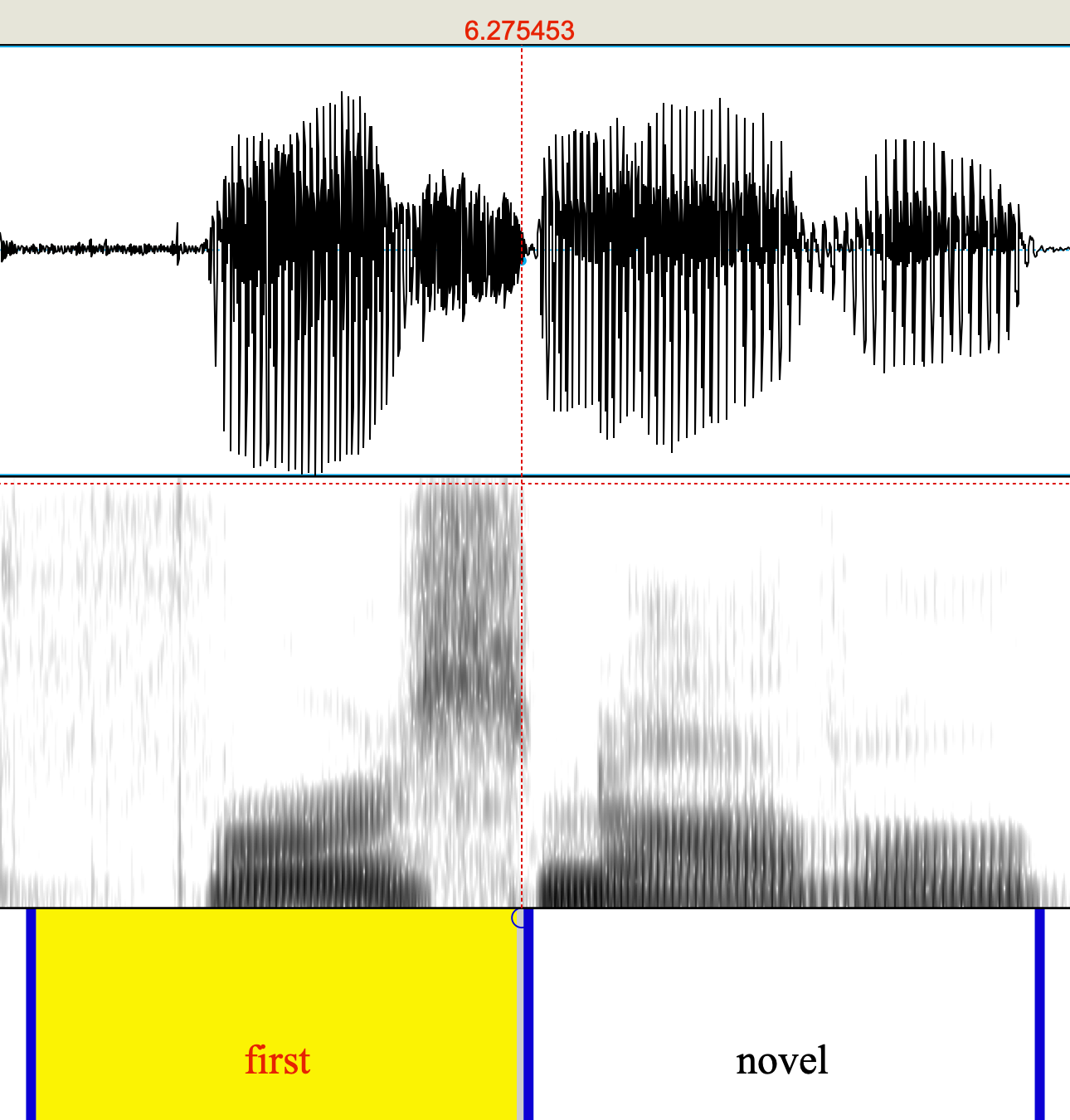Archive for March, 2022
Canine intonations
I live in a duplex. Even though the two houses are separated by a thick brick wall, I sometimes hear sounds coming from my neighbor's place. The most conspicuous are the vocalizations made by her dog, Izzy.
Izzy is some kind of South Carolina coon hound. We live in Swarthmore, Pennsylvania, but my neighbor got her female dog from a rescue service in South Carolina.
Izzy is quirky. She is unique. I have never heard any other dog like her. She doesn't just bark; she talks. Izzy's voice projects emphasis, querulousness, inquiry, complaint, displeasure, joy, dismay, and a whole range of other emotions and intentions. Sometimes she seems to be talking to herself (muttering and mumbling), and sometimes she seems to be communicating with her owner or other people around her.
Read the rest of this entry »
QAnon phonetics
David Gilbert, "QAnon Thinks Trump Says ‘Chy-na’ to Send a Secret Message About Ukraine", Vice 3/14/2022:
QAnon followers are boosting an unhinged new conspiracy theory that claims former President Donald Trump was purposely mispronouncing the word “China” for years, as part of a secret plot to alert the world that COVID-19 was manufactured in Ukraine.
The latest conspiracy theory being spread among QAnon adherents ties in with the wider conspiracy about U.S. biolabs in Ukraine and suggests that QAnon may be shifting its longstanding perception of China as the enemy.
The new conspiracy theory, first flagged by disinformation expert Marc Owen Jones, has been bubbling up on QAnon channels on Telegram for the past week.
First, some enterprising QAnon sleuth claimed to have “discovered” that there was a place in Ukraine called “chy-na” and further claimed that Trump’s distinct pronunciation of “China” was the former president’s attempt to signal to his followers that what he was talking about was “chy-na” in Ukraine, and not China.
In recent days, the theory has grown, and many QAnon followers now argue that when Trump referred to COVID-19 as the “China virus,” he was secretly referring to the Ukrainian chy-na, and trying to tell the world that the virus was manufactured in Ukraine, a claim that ties in with the broader belief that Ukraine is home to some “deep state” plot to control the world.
Read the rest of this entry »
The Origin(s) of Writing
New article in the Wall Street Journal:
"‘The Greatest Invention’ Review: Written communication was a remarkable breakthrough, made in many different places and at different times." By Felipe Fernández-Armesto, WSJ (March 11, 2022)
There are a number of assumptions and speculations packed into just this title. When we look at the book itself, we find far more. In the wake of the sensationalism and hype over the recently published Kingdom of Characters, lauded in countless reviews, we need to take grand claims about the nature and purpose of writing with a great deal of caution and a pinch of salt. Fernández-Armesto's review is appropriately critical.
The review begins:
Theuth, the eager god, was proud of having invented writing. “It will,” he promised King Thamus, “make the Egyptians wiser and improve their memories.” Thamus, in Plato’s account of the myth, disagreed. “Your invention will make readers forgetful. They will stop trying to remember. They will absorb words without wisdom, data without learning, information without knowledge, and trivia without truth.”
The king’s criticisms eerily foreshadow current animadversions about the internet. Even when applied to writing, they were not entirely misplaced. Intellectuals should take them as a warning against overrating the scribe’s art. We tend to assume that the function of text is to perpetuate creativity, imagination and science. Really, however, writing began, in all the cases we know, by serving humdrum purposes: recording prices, inventories and tax returns. For most of the past, what was truly great was easily memorable: the epics, the myths, the revelations of the gods.
Read the rest of this entry »
Tai People in South China
[This is a guest post by Bob Ramsey]

Fairy Tale-like Landscape in Guangxi
Millions in South China today, especially in Guangxi, are not Han Chinese at all, but “Tai.” Tai groups in China include, among others, the Dai, the Li, and the Zhuang. Culturally and linguistically related to the Thai (or Siamese) of Thailand, Tai in China don’t ordinarily stand out as different. They live among Han Chinese. Most look and act Chinese. They wear the same clothes. Most are bilingual in Cantonese or some other variety of Chinese. Nevertheless, the PRC classifies them as minorities, and some pose for the tourist trade, sporting exotic “native” clothes and putting on colorful festivals for paying visitors.
Read the rest of this entry »
Advanced techniques
I'm in the process of composing a "cheat sheet" of DSP techniques for ling525, so today's xkcd is right on time:
Read the rest of this entry »
"Little Russian"
In "Give Elfdalian, Haitian, Limburgish, Patois, Ukrainian and, yes, Black English their due", NYT (3/11/22), John McWhorter writes:
It was long ago common for Russians to regard Ukrainian as just a dialect of Russian. “Little Russian,” it was called. Writing for The Conversation this week, Florida International University’s Phillip Carter said, “If you ask some Russian nationalists, Ukrainian isn’t a language at all,” noting that in the 1863 Valuev Circular, Pyotr Valuev, Russia’s interior minister, decreed that a separate Ukrainian language did not exist.
Read the rest of this entry »
Flop oil
Ruki Sayid & Ben Glaze, "Boris Johnson returns from Saudi Arabia empty handed after flop oil beg trip", The Mirror 3/17/2022:
Boris Johnson is landing back in Britain empty-handed this morning after his oil begging trip to the Gulf flopped – and Vladimir Putin lashed out at the West.
Russia ’s invasion of Ukraine has fuelled price hikes with a litre of unleaded now more than £1.60, piling misery on British families already struggling with household bills.
Read the rest of this entry »
Kurt Reillag and House of Cats and Dogs
A recent email from my colleague Jean Gallier explains why the new edition of Discrete Mathematics is available on his website:
A bit more that three years ago, Springer suggested that I revise my
“Discrete Mathematics” (published in 2010).
Unfortunately, Jocelyn and I
waited too long and now that we are done
Springer no longer wants it.
I added a chapter on probability theory and made some
significant changes (improvements!). I also changed the title.
There is even an intro to the simply-typed lambda-calculus!
In any case, temporarily I am falling back on the little known publisher
“Kurt Reillag and House of Cats and Dogs”.
Interested readers may observe a certain relationship between "Reillag" and "Gallier", and in any case web search will turn up Reillag's home page — which provides this post's main linguistic relevance.
Read the rest of this entry »
The weirdness of typing errors
In this age of typing on computers and other digital devices, when we daily input thousands upon thousands of words, we are often amazed at the number and types of mistakes we make. Many of them are simple and straightforward, as when our fingers stumblingly hit the wrong keys by sheer accident. People who type on phones warn their correspondents about the likelihood that their messages are prone to contain such errors because they include some such warning at the bottom:
Please forgive spelling / grammatical errors; typed on glass // sent from my phone.
Read the rest of this entry »
Grammar in schools
"Rules for teaching grammar in schools", The Economist 3/12/2022 ("It may not make children better writers. But it is valuable all the same"):
Absence of evidence is not, as the saying goes, the same thing as evidence of absence. But if you continue looking for something intently, and keep failing to find it, you can be forgiven for starting to worry. And so it is with the vexed—and in Britain, highly politicised—subject of explicit grammar teaching in schools, and its link or otherwise with improved writing ability.
Another study, in this case a large randomised controlled trial, has recently been added to the expansive literature on the subject. Like nearly all its predecessors, it found that teaching kids how to label the bits and pieces in a sentence does not make them better writers.
[…]
In retrospect it scarcely seems surprising that learning to underline a modal verb, such as “can”, “should” and “may”, does little to help students use them effectively in their own writing. These words are anyway grasped by tiny children without the need to know what they are called. This may tempt the conclusion that the teaching of grammar should be shelved altogether. But there are reasons to reform it rather than scrap it.
Understanding of language is part of a wider education in what makes human beings human.
Read the rest of this entry »
Postdocs on ancient scripts: Chinese and Aegean
Since these are on subjects that are of interest to many of us, I'm calling them to your attention.
From Mattia Cartolano:
The INSCRIBE project is hiring!
Two post-doc positions are now available:
- Evolution of Graphic Codes: The Origins of the Chinese Script
- Undeciphered Aegean Scripts: New perspectives in Computational Linguistics
Deadline for applications: Sunday 27 March 2022
If you want to find out more, write to s.ferrara@unibo.it
Read the rest of this entry »
Permalink Comments off
First novels
I traditionally start my phonetics courses with an "over-under bet", about how much randomly-selected audio we need to listen to (and look at), before we find a systematic, interesting, and essentially unstudied phenomenon. In the case of English, I generally offer 20 seconds as the threshold value — for less well-studied languages like French or Chinese, the threshold might be 10 seconds. For understudied languages, 3 seconds.
This came up a few weeks ago in my corpus phonetics course, and so we took a look at the most recent Fresh Air podcast at that point: "With a nod to 'Lolita,' 'Vladímír' makes a sly statement about sex and power", 2/22/2022.
Here's the first bit of the show (a little less than 12 seconds):
This is Fresh Air.
Our book critic Maureen Corrigan says
Julia May Jonas's new first novel,
called Vladímír,
should spark a lot of heated discussions
on today's campuses.
And the first interesting-and-unstudied phenomenon turns up after about 6.2 seconds:
Read the rest of this entry »


